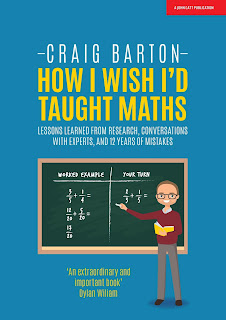There's been a battle for teachers' (and parents') hearts and minds over the last few decades that, now appearing on twitter, can on some days seem particularly virulent. No, I'm not talking about the reading wars, but a broader dispute between what is often called "traditional" versus "progressive" approaches to teaching and learning. Or to use a catch phrase often used, pejoratively I'm afraid, as a choice between the teacher being "the sage on the stage" versus "the guide on the side".
In the Australian context, it feels this debate is pretty much a one-sided affair, with almost unquestioning acceptance that we need more "future focused, student centred" learning, but for those following the broader international scene, it's remarkable to witness the resurgence and reformation of traditional approaches into "knowledge based, explicit teaching" informed by findings from cognitive psychology. For the mathematics teachers among us, it's been fascinating to see some high profile teachers in Britain completely change their view on how to teach mathematics - switching from very innovative "student centred discovery learning" approaches to embracing their inner "teacher as the subject expert".
 |
| Craig Barton, a highly respected UK mathematics teacher, writes in 2018 about his almost 180 degree change of view on how to teach mathematics. |
But meanwhile the slanging matches continue - it can be quite ugly some days to read the ad hominem attacks and to see the emotive grenades being tossed over the trenches. What is a teacher to do? Especially if they have formed a view that isn't the currently dominant view? How can we move forward?
#1: Respect and recognition for our colleagues ("niceness")
Right from the outset, I think we need to set a much much better example to the outside world as to how educated people can have a proper and respectful debate. It really disturbs me to see teachers write messages on twitter that exhibit behaviour we would not accept in our students. It's essential we recognise that even if we 100% disagree with a fellow educator, even if we think they are naive/partisan/ignorant/bigoted, that we recognise they are motivated by the very best intentions: the well being and care of young people. I may not concede that motivation for some others in the education debate (especially people with products to sell), but it's axiomatic to me that I respect and recognise that anyone who signs up to be a teacher and stays with it really has the best motivation. Let's remember that and start every discussion with the right tone. My mum called it "being nice".
#2: Remember context, context, context
Just as the real estate agent reminds us it's all about "location, location, location", as teachers it's essential we keep "context, context, context" at front of mind. Each time we are about to say that something "for sure is correct", or "definitely doesn't work", we need to remind ourselves just how much context matters. What works for a Year 8 mathematics teacher with a specific class for a specific year for a specific group of students may well not work for a Year 4 primary teacher or a Year 12 music teacher in a different year, at a different school. It's so easy to get caught up in your own certainty, your lived experience as reality, and forget context. Am I a "relativist"? No I'm not, it is my view now that there are some universal things we can confidently say about teaching and learning. But on a broader scale, education truly is a "wicked problem" - there aren't many simple answers that work everywhere. We need a lot more caveats in our heated debates to explain our context and to recognise different contexts.
#3: Can we change the words? Mode A and Mode B
Tom Sherrington, in his wonderful book "The Learning Rainforest" takes an interesting approach to defuse the angst: just stop using the words "traditional" and "progressive". Instead use the generic terms "Mode A" and "Mode B".
 |
| A language reset : "Mode A" and "Mode B". Tom Sherrington's book is my #1 reading pick for 2019. |
This is a surprisingly powerful technique - it reduces the emotion and short circuits the automatic, non-thinking responses. It allows Tom to make statements like "for my subject, for my group of students, I think 80% Mode A and 20% Mode B is a good mix". And then we can calmly look at the ideas, strengths and challenges inherent in each different Mode A and Mode B teaching technique, without getting bogged down in polemics.
So does that mean there shouldn't be a debate?
Certainly not! There's lots to debate about when it comes to teaching and learning and it's important, especially if we believe, as I do, that well educated young people are an essential component to addressing challenges such as climate change, socioeconomic inequality and role of technology in our future. But we need to deescalate. It's not an arms race - we need diversity in our education systems and every school will have a blend of Mode A and Mode B. Different students will respond differently to different teachers, to different teaching and learning strategies. Diversity is the strength of our system.
Thank-you for addressing this. It is all very confusing.
ReplyDeleteThe 'future-focused' message being received seems to be very different from the actual version being advocated and the 'traditional' approach being advocated is incomparable to the traditional schooling I received.
Future-focused teaching and learning advocated by the DoE describes Learning modes which includes 'Explicit' [1]. Similarly, in describing "What works best", CESE's themes draw from the traditional and progressive elements [2]. As you have said, we need a blend.
[1] https://education.nsw.gov.au/teaching-and-learning/curriculum/learning-for-the-future/future-focused-learning-and-teaching/learning-modes
[2] https://www.cese.nsw.gov.au/publications-filter/what-works-best-evidence-based-practices-to-help-improve-nsw-student-performance
Just bought 'How I Wish I'd Taught Maths'and I hope I will think: How I Wish I'd Read This Book Earlier
ReplyDelete